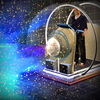Draft Wireframe Slow
 Dondec
Posts: 243
Dondec
Posts: 243
Hi everybody,
I'm trying to render a long wireframe animation to splice into a regular Photo Real render. I'm finding the Render Room's DRAFT - Wireframe mode exceedingly slow. It seems to be tied to the Tile Size, max 128, but if set smaller does the whole render proportionately slower. It also ignores multi-core CPUs, rendering a single 128 pixel block at a time on my 8 core machine.
By contrast the Assemble Room's wireframe via Sequencer PLAY mode can easily do a full screen 1 fps, which has the same quality I think as the Render Room's 1000x slower render.
Is this like a bug, or just some Option setting I don't have right.
Thanks in advance
- Don


Comments
It is legacy code. I believe the render room draft renders are not multi-threaded. I don't know about the non-photo real renderer. If you have another computer, they can be rendered over the network which may help a little.
The wireframe view in the Assembly room is handled by your video card, if you have the Interactive renderer set to OpenGL. That is why it is faster. It may not draw all the lines either.
There are some other functions that are not multi-threaded as well. I'm thinking the some of the render effects such as 3D Aura, Depth of Field, etc.
The standard rigid body physics engine may not be multi-threaded either. Don't know about the Bullet engine...
The work-around to this, is that I seem to recall that there is a plugin called Wireframe Pro. Not sure who makes it, but you can probably find out at the Carrara Cafe. Look on the right side of the screen under Carrara Quick Links--> Plugins. They're listed by vendor so it may take a little hunting.
http://carraracafe.com/
There may also be a way to get a pseudo wireframe look by using the wires shader in the Texture room. I'll post a couple examples of how wires could be used.
You'll want to use a color gradient tf you want the wires colored something other than black. The left side of the gradient will be the color of the wires and the right side of the gradient will be the color of the squares between the wires.
You'll also want to use a gradient and wires in the alpha channel. Use white on the left side of the gradient to make the wires opaque and black on the right side to make the spaces in between the wires transparent.
If you want a uniform brightness to the shader, copy and past the the color gradient from the color channel into the glow channel.
Note that the slider under Wires only goes to 30, but you can manually type in the desired amount if you need more.
Thx once again evilproducer. I'll check out that plugin, and as for the wires shader, that's a interesting and clever idea. Can't really use it here though, I need the varied shading effects the wire render produces against the texture materials, like in the attached (hope this shows... I don't see it in the reply preview). Anyway, this is from the Howie Farkes Harpsburg set. I know, looks like gobblygook here, but its kick ass in my stereoscopic 3D video.
- Don
I figured wires would be of limited use. Otherwise there wouldn't be a market for the plugin. I wish I had it so I could let you know how it works.
I figured wires would be of limited use. Otherwise there wouldn't be a market for the plugin. I wish I had it so I could let you know how it works.Yeah... me too.